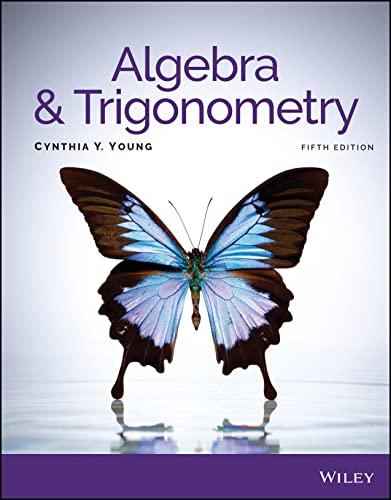Question
1.(12 pts) Explain (1) what is wrong with each of the following randomization procedures and (2) describe how you would do the randomization correctly. You
1.(12 pts) Explain (1) what is wrong with each of the following randomization procedures and (2) describe how you would do the randomization correctly. You should use your notes and think about things like sampling bias, and proper randomization schemes we discussed in the notes and how to employ them.
(1)Ten subjects are to be assigned to two treatments, 5 to each. For each subject, a coin is tossed. If the coin comes up heads, the subject is assigned to the first treatment; if the coin comes up tails, the subject is assigned to the second treatment.
(2)Twenty students are to be used to evaluate a new treatment. Ten men are assigned to receive the treatment and 10 women are assigned to be the controls.
(3)An experiment will assign 40 rats to 4 different treatment conditions. The rats arrive from the supplier in batches of 10 rats and the treatment lasts two weeks. The first batch of 10 rats is randomly assigned to one of the four treatments, and data for these rats are collected. After a one-week break, another batch of 10 rats arrives and is assigned to one of the three remaining treatments. The process continues until the last batch of rats is given the treatment that has not been assigned to the three previous batches.
1.(12 pts) Explain (1) what is wrong with each of the following random selection procedures and (2) explain how you would do the random selection correctly. You need to use concepts from the notes, such as simple random sampling, stratified random sampling, to answer these questions.
(1)A population of subjects is put in alphabetical order and a simple random sample of size 10 is taken by selecting the first 10 subjects in the list.
(2)To determine the reading level of an introductory statistics text, you evaluate all the written material in the third chapter.
(3)You want to sample student opinions about a proposed change in procedures for changing majors. You hand out questionnaires to 100 students as they arrive for class at 7:30am.
1.(6 pts) Two drugs were tested to see whether they helped women who had breast cancer without lymph node involvement. The drugs are called TAC (docetaxel, doxorubicin, and cyclophosphamide) and FAC (fluorouracil, doxorubicin, and cyclophosphamide). About half of the 1060 women with breast cancer without lymph node involvement were randomly assigned to TAC and the other half were assigned to FAC. After 77 months, 472 out of 541 of the women assigned to TAC were alive and 425 out of 524 women assigned to FAC were alive (Source: Martin et al., Adjuvant docetaxel for high-risk, non-negative breast cancer, New England Journal of Medicine 363(23): 2200-2210)
(1)Find the sample percentages of survival and compare them descriptively.
(2)Was this an observational study or an experiment? Explain why. From studies like these, can we conclude a cause-and-effect relationship between the drug type and the survival percentage? Why or why not?
Step by Step Solution
There are 3 Steps involved in it
Step: 1

Get Instant Access to Expert-Tailored Solutions
See step-by-step solutions with expert insights and AI powered tools for academic success
Step: 2

Step: 3

Ace Your Homework with AI
Get the answers you need in no time with our AI-driven, step-by-step assistance
Get Started


